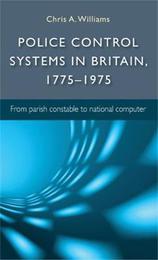
|
Police Control Systems in Britain, 1775-1975: From Parish Constable to National Computer
Hardback
Main Details
| Title |
Police Control Systems in Britain, 1775-1975: From Parish Constable to National Computer
|
| Authors and Contributors |
By (author) Chris Williams
|
| Physical Properties |
| Format:Hardback | | Pages:256 | | Dimensions(mm): Height 216,Width 138 |
|
| Category/Genre | British and Irish History |
|---|
| ISBN/Barcode |
9780719084294
|
| Classifications | Dewey:363.2094109034 |
|---|
| Audience | | Tertiary Education (US: College) | | Professional & Vocational | | General | |
|---|
| Illustrations |
Illustrations, black & white|Graphs
|
|
Publishing Details |
| Publisher |
Manchester University Press
|
| Imprint |
Manchester University Press
|
| Publication Date |
28 February 2014 |
| Publication Country |
United Kingdom
|
Description
During the last two centuries, the job of policing in Britain has been transformed several times. This book analyses the ways that police institutions have controlled the individual constable on the 'front line'. The eighteenth-century constable was an independent artisan: his successor in the Metropolitan Police and other 'new' forces was ferociously disciplined and closely monitored. Police have been controlled by a variety of different practices, ranging from direct day-to-day input from 'the community', through bureaucratic systems built around exacting codes of rules, to the real-time control of officers via radio, and latterly the use of centralised computer systems to deliver key information. Police forces became pioneers in the adoption of many technologies - including telegraphs, telephones, office equipment, radio and computers - and this book explains why and how this happened, considering the role of national security in the adoption of many of these innovations. It will be of use to a range of disciplines, including history, criminology, and science and technology studies. -- .
Author Biography
Chris A. Williams is Senior Lecturer in History at the Open University -- .
ReviewsDr Chris A Williams undertakes an ambitious project in attempting to analytically discuss aspects of the development of a public institution over a 200-year period, within a publication limited to 242 pages. Yet, in producing this book, he successfully negotiates the complex issue of defining crucial topics that formed the operational world of those who policed British society from the industrial revolution through to the space age. The publication develops three key themes: the development and evolution of mechanisms that directed the control of the operational police constable, what guided and regulated him; the introduction of various types of technology that assisted in controlling the duties he performed; and how these wider innovations correlated with philosophical theories of control. Whilst much has been written in relation to the development of policing society, particularly during the Victorian period, this work provides a fresh and new perspective on how the police were managed and evolved into modern day technocrats, utilising the latest technology, when dealing with the day-to-day problems created within society. -- .
|